
Reti Medievali Rivista
Scope & Guideline
Fostering Dialogue in Medieval Scholarship
Introduction
Aims and Scopes
- Interdisciplinary Historical Analysis:
The journal promotes a multidisciplinary perspective, incorporating insights from various fields such as history, archaeology, sociology, and law to provide a comprehensive understanding of medieval society. - Focus on Regional Studies:
There is a consistent emphasis on specific geographical regions, particularly Italy and its historical contexts, allowing for in-depth analysis of local developments and their broader implications. - Exploration of Social Structures and Communities:
Research often delves into the social dynamics of medieval communities, including issues of class, gender, and communal identities, reflecting on how these elements shaped historical narratives. - Economic and Fiscal Histories:
The journal frequently addresses economic aspects of medieval life, including taxation, trade, and the role of fiscal policies in shaping societal structures, thereby contributing to the understanding of medieval economies. - Religious and Cultural Developments:
The impact of religious institutions and cultural movements, such as the role of the Franciscans and the evolution of religious practices, is a recurrent theme, highlighting the intersection of faith and daily life. - Legal Histories and Practices:
A significant focus on legal frameworks, the evolution of legal practices, and their societal implications, particularly in relation to governance and community organization.
Trending and Emerging
- Environmental and Spatial Studies:
There is an increasing focus on the relationship between communities and their environments, exploring how geography influenced social structures and economic activities in medieval settings. - Community and Social Dynamics:
Research examining the formation and evolution of communities, including their social interactions and governance structures, has gained traction, reflecting a broader interest in microhistorical approaches. - Economic Transformations and Taxation:
Emerging themes related to economic transformations, particularly the analysis of taxation systems and their impact on medieval societies, suggest a growing interest in understanding the economic underpinnings of historical contexts. - Cultural Memory and Identity:
The exploration of cultural memory, identity, and the role of historical narratives in shaping communal identities is becoming increasingly relevant, indicating a trend towards interdisciplinary studies that incorporate memory studies. - Franciscan Studies and Religious Movements:
Research on the Franciscan order, including its social, cultural, and economic implications, is seeing a resurgence, reflecting a renewed interest in the interplay between religion and society during the medieval period.
Declining or Waning
- Late Medieval Political History:
There has been a noticeable decrease in papers specifically addressing late medieval political dynamics, possibly indicating a shift towards more localized or thematic studies rather than broad political analyses. - Studies on Artistic Developments:
Research pertaining to the artistic movements and expressions of the medieval period appears to be less frequent, suggesting a waning interest in this area compared to other historical themes. - Gender Studies in Medieval Contexts:
While gender remains an important topic, the volume of studies specifically examining gender roles and relations in medieval societies has diminished, possibly overshadowed by broader social and economic analyses. - Military History and Warfare:
The journal has published fewer articles focused on military history and warfare strategies, indicating a potential shift towards social and economic histories over traditional military narratives.
Similar Journals

De Medio Aevo
Advancing Knowledge in the Heart of Medieval StudiesDe Medio Aevo is a distinguished academic journal published by UNIV COMPLUTENSE MADRID, SERVICIO PUBLICACIONES, dedicated to enriching the fields of Cultural Studies, History, Literature and Literary Theory, Philosophy, Religious Studies, and Visual Arts and Performing Arts. Since its inception in 2012 as an Open Access platform, this Spanish journal has rapidly established its reputation, achieving impressive rankings in various categories with a Q1 classification in Literature and Literary Theory and notable positions in Q2 across other fields as per the 2023 metrics. With an emphasis on rigorous scholarly research, De Medio Aevo seeks to foster the exchange of ideas and insights that reflect the rich tapestry of medieval studies and its ongoing impact on contemporary society. It is an essential resource for researchers, professionals, and students alike, encouraging interdisciplinary dialogue and exploration of the cultural narratives that shape our understanding of history and the arts. Located in Madrid, Spain, the journal is committed to making significant contributions to its fields, with a global reach and a focus on academic excellence.
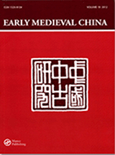
Early Medieval China
Bridging Disciplines to Reveal Early Medieval ChinaEarly Medieval China is a distinguished journal published by ROUTLEDGE JOURNALS, TAYLOR & FRANCIS LTD, specializing in the intricate study of early medieval China through an interdisciplinary lens that encompasses Anthropology, Cultural Studies, History, Literature and Literary Theory, Philosophy, and Religious Studies. With a commendable impact factor and a prestigious standing in various quartile rankings, such as Q1 in Literature and Literary Theory and Q2 in Cultural Studies and History for 2023, this journal serves as a vital resource for scholars, researchers, and students alike. It aims to promote a deeper understanding of China's early medieval period by publishing innovative research, critical essays, and comprehensive analyses that contribute to the broader discourse on Asian studies and history. By offering a platform for cutting-edge research, Early Medieval China plays an essential role in enriching academic dialogue and fostering further explorations in this historically significant field.
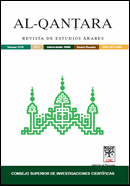
AL-QANTARA
Empowering Voices in Interconnected Humanities Research.AL-QANTARA, published by the Consejo Superior Investigaciones Cientificas (CSIC), is a prestigious academic journal that has been at the forefront of interdisciplinary research in the fields of Cultural Studies, History, and Literature and Literary Theory since its inception in 1984. Renowned for its commitment to open access since 1996, the journal promotes a comprehensive understanding of the interconnectedness of cultural narratives and historical discourse, making it an invaluable resource for researchers and students alike. With impressive rankings in Scopus—including a top placement in the Q1 category for Literature and Literary Theory and Q2 in both Cultural Studies and History—AL-QANTARA effectively bridges theoretical insights with empirical research, contributing to robust academic dialogue and innovation. Operating out of Madrid, Spain, it stands as a pillar of scholarly excellence, offering a platform for diverse voices in the humanities to share their findings and engage with critical contemporary issues.
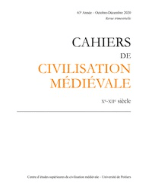
CAHIERS DE CIVILISATION MEDIEVALE
Advancing Knowledge of Medieval CivilizationCAHIERS DE CIVILISATION MEDIEVALE is a distinguished scholarly journal focusing on the multifaceted aspects of medieval civilization, including its history, literature, visual arts, and performing arts. Published by the CENTRE ETUD SUPERIEUR CIV MED in France, this journal serves as a vital resource for researchers, professionals, and students striving to deepen their understanding of the medieval period. Although the journal’s impact factor and HIndex are not explicitly listed, it has been categorized in Q4 for 2023 in key areas such as History and Literature, indicating its role within niche academic discussions. With content spanning converged publication years from 2002 to 2014 and 2017 to 2023, CAHIERS DE CIVILISATION MEDIEVALE aims to foster a rich dialogue among scholars in the field, while its accessibility options provide a pathway for the dissemination of knowledge. Dive into the intricate world of medieval studies through this essential publication, which seeks to elevate the discourse and provide a platform for innovative research.
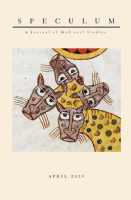
SPECULUM-A JOURNAL OF MEDIEVAL STUDIES
Connecting Disciplines Through Medieval InquirySPECULUM: A Journal of Medieval Studies, published by University of Chicago Press, stands as a premier academic platform within the field of medieval studies. With an impressive legacy dating back to its inception in 1926, this journal has attracted scholarly contributions that explore the rich tapestry of human experience during the medieval period, encompassing areas such as history, literature, philosophy, cultural studies, and the visual and performing arts. It boasts elite rankings—Q1 in History, Literature and Literary Theory, Religious Studies, and Visual Arts and Performing Arts, with a commendable Q2 in Cultural Studies and Philosophy—attesting to its impact and relevance in academia. Although it is not an open-access journal, the rigorous peer-review process and critical scholarship found within its pages provide invaluable insights for researchers, professionals, and students alike. With a substantial Scopus ranking, ID 0038-7134, and E-ISSN 2040-8072, SPECULUM continues to serve as an essential resource for advancing knowledge and understanding of the medieval world, encouraging interdisciplinary dialogue and scholarly interaction.

Drevnyaya Rus-Voprosy Medievistiki
Fostering Insight into Medieval HistoriographyDrevnyaya Rus-Voprosy Medievistiki is a prestigious journal published by INDRIK that focuses on the rich tapestry of medieval studies, particularly centered around the history and culture of Ancient Rus. With its ISSN 2071-9574, this journal aims to contribute significantly to the academic discourse surrounding medieval historiography, archaeology, and cultural studies through original research, comprehensive reviews, and scholarly articles. Although it does not currently operate under an open access model, Drevnyaya Rus remains a vital resource for researchers and students interested in the complexities of medieval civilization. Located in Moscow, Russia, the journal seeks to foster a deeper understanding of Eastern European history and its implications on contemporary society. By providing a platform for rigorous scholarship, it plays a crucial role in expanding the knowledge base within the field of medieval studies, thereby catering to the interests of historians, archaeologists, and cultural theorists alike.

Revista Chilena de Estudios Medievales
Illuminating the Past: Open Access to Medieval ResearchRevista Chilena de Estudios Medievales, published by Universidad Gabriela Mistral, is a premier open access journal that has been serving the field of medieval studies since 2012. With its unique ISSN 0719-2215 and E-ISSN 0719-689X, this journal provides a vital platform for scholars, researchers, and students interested in the rich tapestry of medieval history, literature, and culture. Located in Santiago, Chile, at Ladislao Errazuriz 2073, Providencia, Santiago 00000, the journal aims to foster a deeper understanding of the medieval period through interdisciplinary research and insightful articles. While impact factors and HIndex data are currently unavailable, the journal is dedicated to maintaining high academic standards and promoting knowledge dissemination in the field. Its open access model ensures that research is freely available to the global community, thereby enhancing engagement and collaboration among medieval studies scholars. Join us in exploring the depths of the medieval world through Revista Chilena de Estudios Medievales.
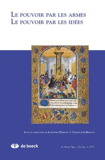
MOYEN AGE
Connecting Past and Present through Scholarly DialogueMOYEN AGE is a distinguished academic journal published by LE MOYEN AGE BOECK & LARCIER S A in Belgium, focused on the multifaceted disciplines of History, Linguistics, and Literature. With its ISSN 0027-2841 and E-ISSN 1782-1436, this journal serves as a platform for researchers, professionals, and students alike to engage with scholarly articles that contribute to the understanding of medieval studies. Although currently categorized in the fourth quartile across various fields as of 2023, MOYEN AGE demonstrates a commitment to fostering academic dialogue and exploration around historical linguistics and literary theory. The journal is available via subscription, making it an essential resource for those looking to deepen their knowledge in its scope, which spans from 2001 through 2024. As it continues to evolve, MOYEN AGE remains a relevant source for emerging thinkers and established scholars drawn to the complexities of the medieval era.

Zbornik Radova Vizantoloskog Instituta
Connecting Scholars Through the Lens of Byzantine StudiesZbornik Radova Vizantoloskog Instituta is a distinguished open-access journal published by the Institute of Byzantine Studies, Serbian Academy of Sciences and Arts, located in Belgrade, Serbia. Since its inception in 2003, this journal has served as a vital platform for the dissemination of scholarly research in the fields of Classics, History, Linguistics and Language, and Literature and Literary Theory. Although it currently holds a Q4 ranking in the 2023 category quartiles, its commitment to fostering academic discourse and research accessibility is unwavering. The journal features a diverse range of articles that explore the complexities and nuances of Byzantine studies and related disciplines, catering to a broad audience of researchers, professionals, and students dedicated to the humanities. With a focus on both historical context and contemporary perspectives, Zbornik Radova Vizantoloskog Instituta aims to contribute significant insights into the academic community while promoting scholarly interaction on a global scale.
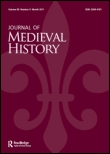
JOURNAL OF MEDIEVAL HISTORY
Charting the Course of Historical Inquiry in the Medieval PeriodJOURNAL OF MEDIEVAL HISTORY, published by Routledge Journals, Taylor & Francis Ltd, stands as a vital resource in the field of historical studies, focusing on the complex tapestry of the medieval period from 1975 to 2024. With an ISSN of 0304-4181 and E-ISSN of 1873-1279, this journal boasts an impressive Q2 categorization in History, ranking #502 out of 1760 in the Scopus Arts and Humanities rankings, placing it in the top 29% of its field. The journal aims to publish high-quality, innovative research that enhances the understanding of medieval history, making it an indispensable read for scholars, practitioners, and students alike. While it does not currently offer Open Access options, its reputable standing ensures that it reaches a wide audience dedicated to exploring the intricacies of the medieval era. Engage with cutting-edge scholarship and historical insights that collectively contribute to the advancement of medieval studies.